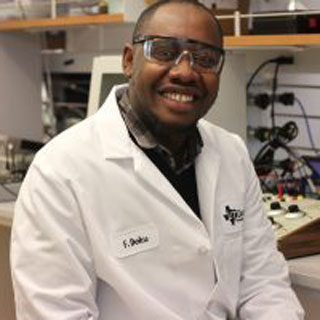news
ALUMNI HIGHLIGHT

Felix Deku PhD’18
Process Engineer, Microfabrication
Neuralink Corp.
How did your experience at The University of Texas at Dallas prepare you for your current position?
As a process engineer at a fast-paced company like Neuralink Corp., I team up with goal driven, highly motivated scientists and engineers to solve challenging problems the neural interface community has encountered for decades. The position requires selflessness, hard work, critical analysis and above all collaboration with other engineers in a multidisciplinary environment. My experience at UT Dallas ensured a smooth transition from graduate school into industry. At UT Dallas, I led the design and development of novel thin-film penetrating brain probes based on amorphous silicon carbide. The portion of the microprobes that penetrate the brain were engineered to be extremely small in order to elude the hostile host immune response. Under the mentorship of Dr. Stuart Cogan, I developed exceptional skills in microfabrication, expertise in electrode material engineering and a deep understanding of neural stimulation. I was exposed to a rich and diverse collaborative environment with local faculty members including Dr. Joseph Pancrazio and Dr. Mario Romero-Ortega as well as world-renowned experts from other academic institutions, industry and government. Academic programs and departmental support both play a part in making a well-rounded graduate, and I will remain forever proud to be associated with the University.
What is the broader impact of your current work?
Human-machine interfaces that modulate sensory, motor and autonomic processes have allowed paralyzed or tetraplegic patients to physically interact with their environment. Several neurological disorders and neurodegenerative diseases such as Parkinson’s disease, Alzheimer’s disease and chronic pain among others are targets of neural stimulation and recording devices. At Neuralink, we are interested in developing ultra-high bandwidth, chronically reliable neural interfaces that connect humans to machines.
Where do you see the biomedical engineering field, or your specific area, going?
The neurotechnology field has advanced tenfold in the past decade. New research tools are readily available, and the fields of neuroscience, material research and biotechnology have made significant advancements. One can only dream of the endless possibility that lies ahead: to reliably interface with patients using chronically stable, high density neural probes to enhance recovery or provide function, but also augment full-bodied individuals to boost intelligence, brain power and thinking speed. For me, the most intriguing aspects of the field are the possibilities we cannot presently comprehend. I remain hopeful that as we research brain function and engineer new and exciting neural interfaces, we will push the boundaries of science and engineering to the great unknown.




